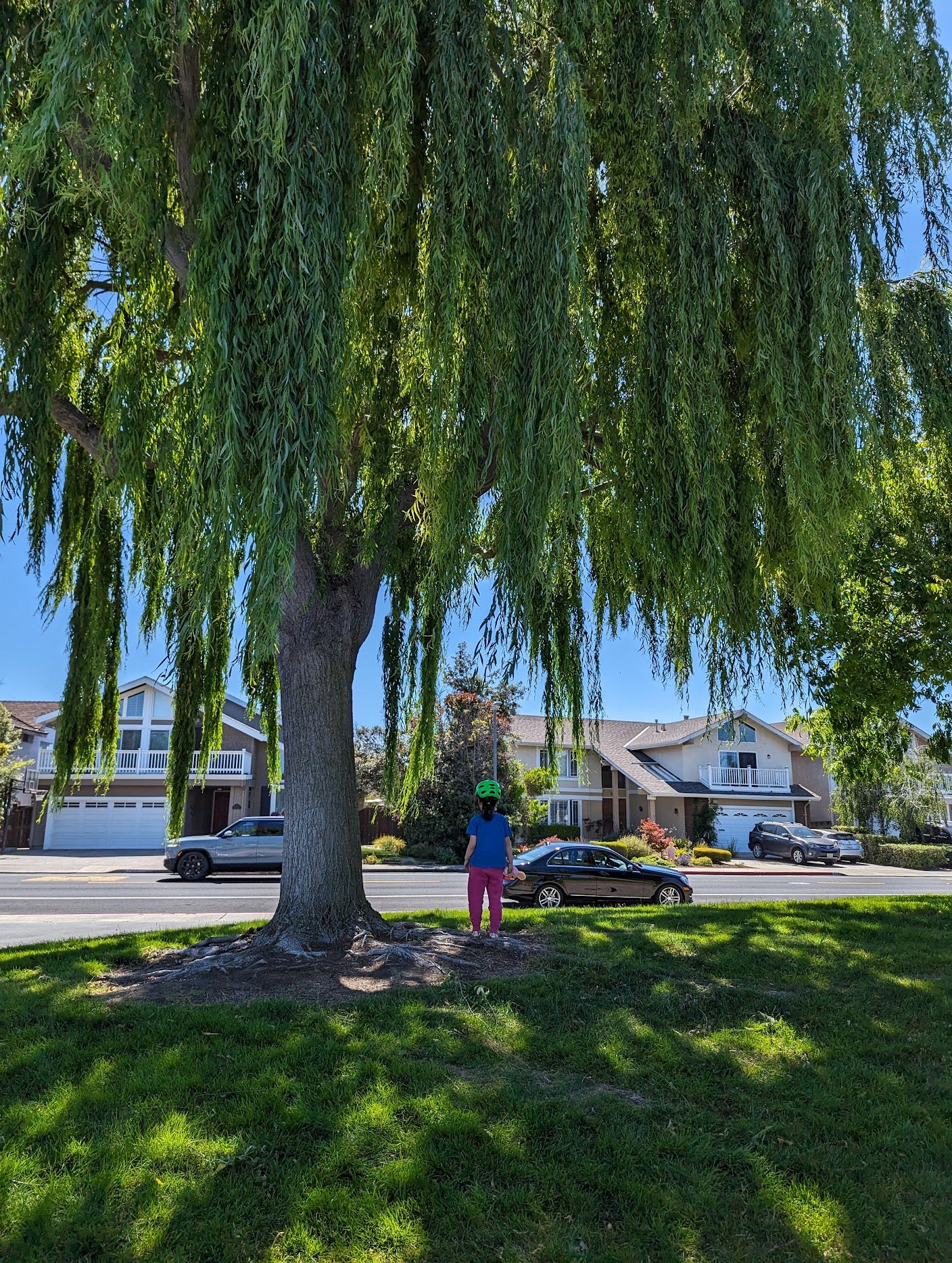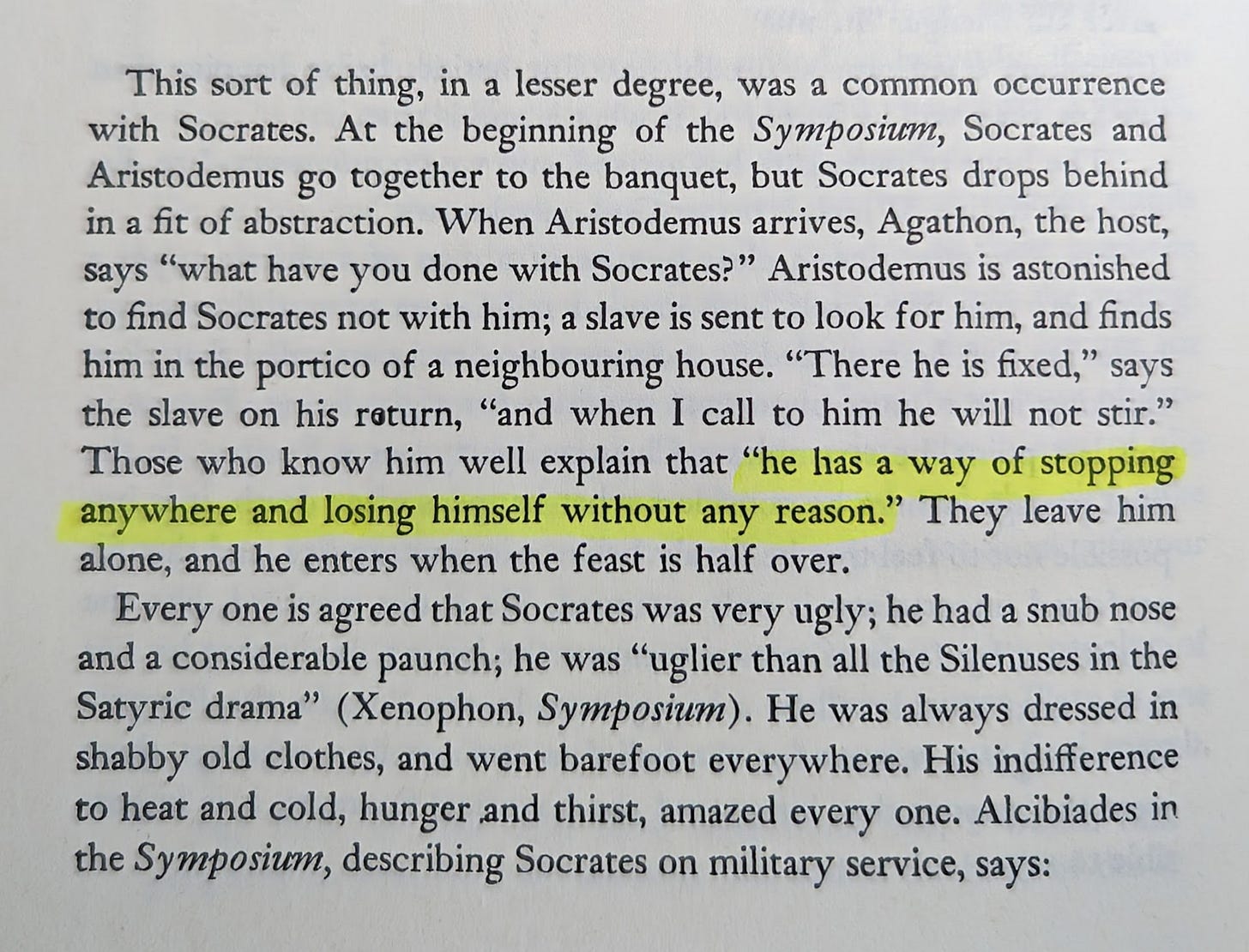Why can't I do the important things?
Like: why can't I just sit with my daughter? I know there's nothing more important, but for some reason I don't actually know it.
Sometimes I love picking my 4-year-old daughter up from school in the middle of the day. Sometimes I keenly feel the respite that it provides. The forced pull back to what I know is important.
But other times I hate it, and I feel so bad about it. I’ll be in the middle of a conversation or in the middle of some all-consuming work thought or in the middle of nothing at all but consumed by the anxiety that comes with doing nothing at all. And she suddenly becomes an inconvenience, keeping me from the things that purportedly matter more.
Of course, I can recognize the twistiness of my internal state: the ever-present anxiety of not doing what I purportedly should be doing. And I see the runaway endocrine loop in my head, keeping me anxious. I see the mixed bag of motivations — the addiction to work, the desire for success, the need to validate my self-importance — all mixing in that space. I can look at it and try to create distance from it, but I can’t stop it. It’s still there, coloring my mood, seeping into the tone of my words, chipping away at the imagination-augmented world she’s walking around in — Totoro characters running alongside here, Paw Patrol characters flying there. “Eleanor, we have to go home, no more running. Listen to Daddy.”
We were watching My Neighbor Totoro the other day (her new favorite movie), and I had already set aside time to watch her. And I knew the most important thing I could do was to immerse myself in the experience and watch the movie with her. I watched for an excruciating 45 minutes before I pulled out my laptop and started doing something “productive”. And, 10 minutes later: “Daddy can you stop typing on your keyboard?”1 Ouch, my heart.
Well, here’s where I’m at. I’ve at least found some things that help, and other things to ruminate on:
Mindfulness has been difficult here, but I’m starting to think that’s because I’d been focusing too much on the anxiety itself2. I’ve noticed instead that trying to anchor on the present moment seems to be better… which sounds kind of trivial, doesn’t it? — if you want to be more present, be more present. But it looks like this: I engage with the present, pushing away the anxiety3 temporarily, then recognizing its pull as it inevitably returns, seconds later. There’s something in the recognition that anxiety is trying to pull you out of the present (which, almost definitionally is true — what else is anxiety but a compulsion to not do what you’re doing now?). Then I notice it pull, and let the pull pass over me, and repeat. The slight difference in posturing helps me sit by the river, rather than float along in it.
It’s also been helpful to recognize that the pulls happen far more frequently, and so resets have to happen quite often. Expecting one quick nod to mindfulness to solve my compulsion is like hoping that sopping up a spill with a paper towel will solve the problem of water gushing out of a broken pipe.
On a more practical level:
I suspect this pattern in large part comes from the oozing-over of the persistent low-grade level of anxiety and stress that compels me to do my work, in general, all day. On days where I’m not working, the feeling isn’t nearly so all-consuming. And it makes sense — the half-life of cortisol is about an hour, and I’m not leaving nearly enough time to let this dissipate (but there’s no way that’s even possible!). While it’s not always possible, loading up less high-stress activities just before pickup also seems to be helpful.
I think the way I default handle time is also not so appropriate for dealing with a 4-year-old. Usually, I just try to do as much as I can all the time, including making progress toward some time-boxed goal, like going home. It sounds obvious, but because of that inclination, setting timers helps me relax, at least for the time during which I know the timer is holding that urgency for me.
All that said, I’ve also come to accept that, to some extent, a low-grade level of excitement and anxiety is just the way my brain interfaces with the world in general. I spend a lot of time flushing the creativity faucet, and the flow just tends to be quite difficult to ignore when I’m trying to focus on something else. I recall this quote describing Socrates quite often in this regard:
And perhaps that’s just the nature of creative work in general (barring the ugly nose). I certainly find myself catatonically consumed by my thoughts sometimes. Maybe the difficulty of turning that off is just one of the tradeoffs that I have to accept in being fortunate enough to be able to turn it on and be in a line of work that values that in the first place, and maybe I just to accept that I need to drop some ideas without rumination. Drinking from that faucet was one of the most important things in my life for a long time, so to try to supplant it with my daughter will certainly create some cognitive dissonance against decades of conditioning.
No silver bullet solutions here, only a mixed bag of thoughts. But if you have anything else for me, let me know, because this one’s been hard.
Another time, she literally grabbed my head and forced me to look in the direction of the monitor. Only sharing this because it was absolutely hilarious.
I think common mindfulness wisdom would probably say that I’m still identifying with it, though that’s not really what it feels like…
Mind you, I don’t think I have any sort of clinical anxiety, but I’m using the term because I don’t have any other way to describe the compulsion to do something else, and I imagine the signatures are somewhat similar.




Thanks for sharing your experience. I can empathize with what you are saying. There are times I am very attentive to my kids, and my actions prove that there is nothing more important. But then there are times where they probably question where they stand in my priorities.
My go to is to read them a 10 minute book every so often throughout the day, or play a quick card game with them. Or we’ll play one or two rounds of his and seek. Instead of one chunk of time that lasts several hours, it ends up being multiple small 10-15 minute chunks throughout the day. It works well for us.
What you might think is an issue of mindfulness might actually be an issue with dopamine and how attached to technology/devices we all are. I struggle with being present with my kids the entire time because of the idea of checking my phone for a quick hit of dopamine by checking email/Twitter/group chat/work. You should look up some videos from Dr. K (Healthy gamer) on the subject - it was helpful for me and your experiences resonated with my own